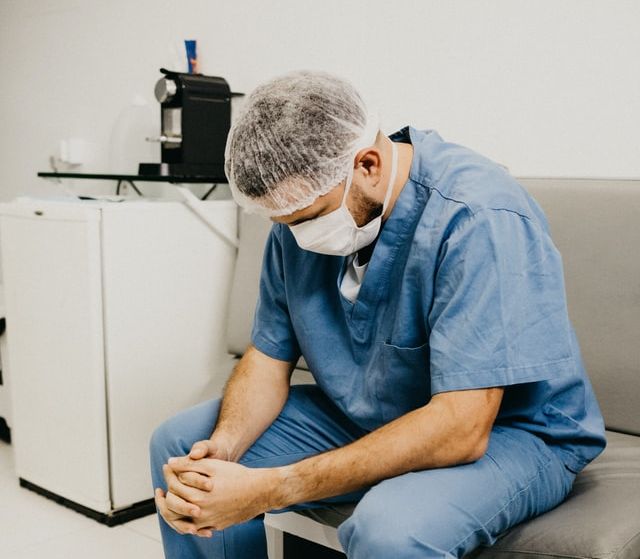The importance of healthcare professionals has increased manifold as it is the healthcare professionals who are at the forefront of the battle humanity is waging against coronavirus. The virus has also infected thousands of medical professionals across the world and, in some cases, their families as well.
Understandably, the virus has unleashed an unprecedented level of psychological trauma on both healthcare providers and patients. While the physical ramifications of diseases get the attention they deserve, their mental and psychological effects often fail to get noticed. As they work night and day to save lives with a constant fear of the disease, healthcare workers are facing unprecedented mental stress. It is important therefore to be highly empathetic and provide all support we can for their mental and psychological well-being.
Healthcare workers at high risk
According to a Lancet study on March 21, figures from China’s National Health Commission showed that more than 3,300 healthcare providers there had been infected as of early March. Another study published in the Journal of American Medical Association found that 41% out of 138 COVID-19 cases examined in the US were person-to-person hospital-associated transmissions. In Spain, 15,000 doctors, nurses and hospital workers were reported to be sick or self-isolating making up 14% of the confirmed cases in that country. This highlights their vulnerability as well as the possibility of hospitals becoming hotspots for the virus.
Lack of protective gear compounds the psychological trauma
Many hospitals in regions where the number of coronavirus infected patients are high have reached full capacity. This has forced the governments of countries like USA, Italy and Spain to convert stadiums as well as other large public places to act as makeshift hospitals and quarantine facilities. It is not just beds and ventilators that are short. The shortage of essential medical supplies like testing kits and protective equipment like specialized masks, gloves and impermeable overalls is acute.
In the face of a shortage of PPE’s, doctors have been forced to reuse protective overalls and use improvised masks made out of plastic screens as well as pieces of cloth. This shortage of crucial protective gear further adds to their mental agony and stress, making them highly vulnerable to the infection.
Ensuring mental health of medical workers is critical
To many people, medical professionals look strong and resilient while treating patients but most don’t know that this calm surface is the only shield they have left against the anxiety and fear that coronavirus has instilled in them. Many of them are afraid that they themselves will get sick especially when the virus is asymptomatic and can potentially infect others including healthy patients and their family members.
To lower this risk, many doctors and nurses have decided to socially isolate themselves from at-risk family members which has reduced their social support network. Healthcare workers are also concerned they might die from COVID-19 which is entirely possible with many deaths in China, Italy and USA.
The choice of protecting themselves or their family is not the only choice they have to make as they take calls on life and death decisions due to limited resources. This has led to a feeling of betrayal as they feel they are being coerced into doing something that compromises their mental health by their employers, the healthcare system and the government… all of whom were terribly unprepared for a pandemic.
With predicted symptoms like acute stress disorder, depression, insomnia and alcohol abuse, experts need to intervene to protect the mental health of medical professionals. Some have no one to talk to about their thoughts and feelings as they enter self-isolation to protect their loved ones which is where support groups can help. Apart from providing an outlet for feelings, support groups are comprised of people with shared experiences and provide insights that family members and friends cannot because they haven’t been subjected to the same ground realities.
Doctors, nurses and frontline Corona warriors could personally try to manage their stress by ensuring sufficient rest after shifts, eating healthy, engaging in some form of physical activity as well as staying in touch with family members and friends.
Mental health professionals can help with comprehensive and multi-faceted approaches that range from helping doctors, nurses and technicians practice mindfulness meditation between shifts to refocus on doing the task at hand, or providing crisis support for those who are trying to emerge from a traumatic episode.
 The author Dr. Prakriti Poddar has been working in the field of Mental Health since 1999. She is the Managing Trustee of Poddar Foundation and has leveraged her passion in mental health and wellbeing to help countless people. The India Leadership Conclave awarded Prakriti with India’s Most Promising Woman Leader in Mental Health, Holistic Support and Wellness Model award in 2017
The author Dr. Prakriti Poddar has been working in the field of Mental Health since 1999. She is the Managing Trustee of Poddar Foundation and has leveraged her passion in mental health and wellbeing to help countless people. The India Leadership Conclave awarded Prakriti with India’s Most Promising Woman Leader in Mental Health, Holistic Support and Wellness Model award in 2017
Views of the author are personal and do not necessarily represent the website’s views.
Thank you for reading. Please drop a line and help us do better.
Regards,
The CSR Journal Team
Subscribe



 The author Dr. Prakriti Poddar has been working in the field of Mental Health since 1999. She is the Managing Trustee of Poddar Foundation and has leveraged her passion in mental health and wellbeing to help countless people. The India Leadership Conclave awarded Prakriti with India’s Most Promising Woman Leader in Mental Health, Holistic Support and Wellness Model award in 2017
The author Dr. Prakriti Poddar has been working in the field of Mental Health since 1999. She is the Managing Trustee of Poddar Foundation and has leveraged her passion in mental health and wellbeing to help countless people. The India Leadership Conclave awarded Prakriti with India’s Most Promising Woman Leader in Mental Health, Holistic Support and Wellness Model award in 2017






